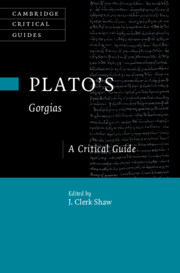Book contents
- Plato’s Gorgias
- Cambridge Critical Guides
- Plato’s Gorgias
- Copyright page
- Contents
- Contributors
- Abbreviations
- Introduction
- Chapter 1 Gorgias of Leontini and Plato’s Gorgias
- Chapter 2 Ancient Readers of the Gorgias
- Chapter 3 Philosophy and the Just Life in the Gorgias
- Chapter 4 Socrates and Coherent Desire (Gorgias 466a–468e)
- Chapter 5 The Ethical Function of the Gorgias’ Concluding Myth
- Chapter 6 Shame in the Gorgias
- Chapter 7 Desire and Argument in Plato’s Gorgias
- Chapter 8 Cooperation and the Search for Truth
- Chapter 9 Freedom, Pleonexia, and Persuasion in Plato’s Gorgias
- Chapter 10 Revealing Commitments
- Bibliography
- Index
- Cambridge Critical Guides
Chapter 7 - Desire and Argument in Plato’s Gorgias
Published online by Cambridge University Press: 25 May 2024
- Plato’s Gorgias
- Cambridge Critical Guides
- Plato’s Gorgias
- Copyright page
- Contents
- Contributors
- Abbreviations
- Introduction
- Chapter 1 Gorgias of Leontini and Plato’s Gorgias
- Chapter 2 Ancient Readers of the Gorgias
- Chapter 3 Philosophy and the Just Life in the Gorgias
- Chapter 4 Socrates and Coherent Desire (Gorgias 466a–468e)
- Chapter 5 The Ethical Function of the Gorgias’ Concluding Myth
- Chapter 6 Shame in the Gorgias
- Chapter 7 Desire and Argument in Plato’s Gorgias
- Chapter 8 Cooperation and the Search for Truth
- Chapter 9 Freedom, Pleonexia, and Persuasion in Plato’s Gorgias
- Chapter 10 Revealing Commitments
- Bibliography
- Index
- Cambridge Critical Guides
Summary
A common view of the Gorgias is that Plato is portraying the limits of Socratic discussion. Interlocutors become hostile, little agreement seems reached, and conversation breaks down. Furthermore, non-rational forces, by which may be included pleasures, pains, epithumiai, and the pathos of eros, come to the fore at various points. These twin factors have led to a growing consensus that what is shown is that discussion is not effective with persons in whom non-rational forces are strong. This chapter questions this consensus, bolstering Socrates’ optimistic reply to Callicles, that if the same things are examined “often and better”, Callicles will be persuaded. It argues that dialogue is a normative practice, which exemplifies the virtues that constitute its subject matter; this enables greater appreciation of how it can play a role in shaping cognition and behaviour. If values are involved in the very operation of dialogue, then participants can become accustomed to the values that form the explicit content of discussion by learning to adhere correctly to its form. Seen as such, Socratic argument is not just determined by the desires of its participants (unlike rhetoric), but is capable of shaping them.
- Type
- Chapter
- Information
- Plato's GorgiasA Critical Guide, pp. 124 - 145Publisher: Cambridge University PressPrint publication year: 2024
- 1
- Cited by

